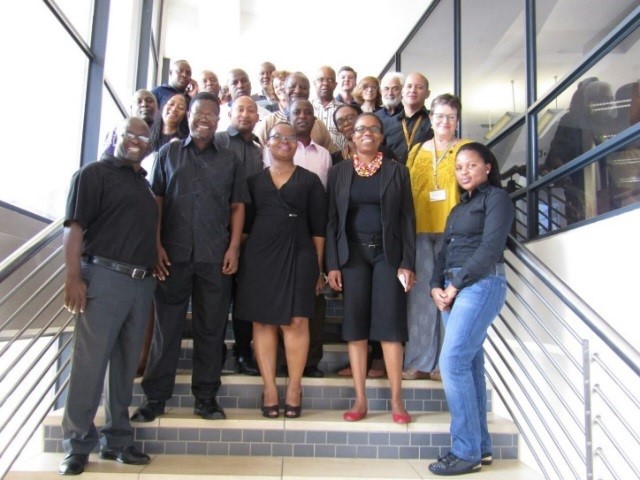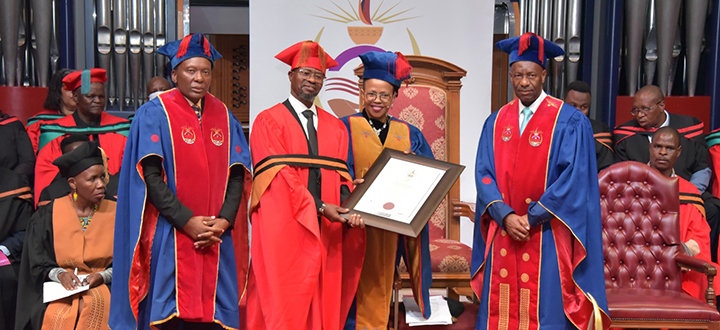College of Human Sciences
Gender Based Violence: a truth telling moment
Every day in South Africa we read and listen to news about stories of Gender Based Violence (GBV), some stories are unfortunately untold and do not make it to statistics reports. The most recent reported incident that shocked South Africa was that of Karabo Mokoena, a 22-year-old part-time business student from Soweto. She was burnt beyond recognition by her 27-year-old boyfriend who is currently under police custody for charges of murder.
Following that, a number of women and children went missing across the country, others found dead with signs of sexual exploitation. To mention a few names, Lindokuhle Kota (two years-old) from Khayelitsha; Courtney Pieters (three years-old) from Elsies River; Stacha Arendse (11 years-old) from Tafelsig; Rene Tracy Roman (13 years-old) from Lavender Hill; Franzika Blochliger (16 years-old) from Kalk Bay; and Candice Alberts (32 years-old) from Slangriver. These suggest that something is seriously wrong, that GBV is a reality and a problem of the 21st century in South Africa for theological discourse and the church.
Setting the scene
It is important that we begin by locating ourselves and declare our interest in this complex subject of GBV. We are both young black women who grew up in townships, one in the Eastern Cape and the other in Gauteng. We are ordained ministers and are both from a Reformed tradition. We have served in congregation in townships and have journeyed with victims of GBV. We are both academics in Theology and doctoral candidates whose research attempts to expose the nexus of race, class and gender and other factors in the quest of liberation of black women. We thus reflect on GBV from these locations and further argue that GBV affects both rich and poor, men and women, and thus we have engaged our male colleagues whose reflections feature in this piece.
GBV and patriarchy
In response to the recent outbreaks of GBV, this is what one of our colleagues, Professor Reggie Nel, had to say: “The recent incidences of horrid gender-based violence has hit a nerve in our national psyche. I however wonder whether religious communities, like the Christian church, have allowed this moment of truth to disrupt our continued patriarchal practices. I doubt. Sadly so. Perhaps this lethargy is because most of the key decision makers in religious communities remain to be men. Perhaps we drag our feet, or laugh along at the misogynous jokes, simply because the current practices serve our interests – our positions and power. Yet, if we don’t go against this status quo, and challenge the unspoken and therefore unchallenged norms, it will remain. We will remain to be part of an oppressive system, supporting the challenge that indeed, #MenAreTrash.”
He further poses a fundamental question: “Can we break this cycle of oppression? I think we can. However, we need truth telling. We need our colleagues to hear and be confronted with the pain that we as men inflict.”
This response suggests that oppression of women and thus GBV not only has it been a socio-historical matter but also it has been justified theologically and sanctioned by the church. The scholar Oduyoye observes that unfortunately, biblical interpretation and Christian theology in Africa have had the effect of sacralising the marginalisation of women's experience. The justification of patriarchy by faith, ostensibly in so-called movements of men in our churches and others worldwide is not only an antithesis to our liberation, but a toxic violation of the dignity of a woman, destined to keep a black man an empty shell perpetually in the world.
If our theologies and Christian teachings have for years, been seedbeds of patriarchy and thus abuse and oppression of women, there is a need of unthinking these theologies and teachings, a task of theology and the church.
Blowing the trumpet: a task of theology
Reflecting on GBV, COD of the Department of Christian Spirituality, Church History and Missiology, Dr Zuze Banda calls for theology in institutions of higher learning to break the silence. He articulates his point by narrating a story of Jesus Christ and his disciples. “When Jesus Christ was travelling with his 12 disciples, the journey was overtaken by a storm that threatened to submerge their boat under the angry waves of the Galilean sea. The disciples’ anguish resulted not only because of the sight of the overwhelming experience of the raging sea that threatened to kill everybody on board, (including Jesus), but also the sight of Jesus who lay calmly asleep in the midst of it all.
“I use this incident as a metaphor that speaks to theology at institutes of higher learning that go about calmly asleep, going about business as usual, while the country is engulfed in sorrow and exasperation because of the current gender-based violence that has plagued our communities. Such silence can only be afforded by an institute that has insulated itself from the horrid realities of our times.”
He adds: “It was Peter who screamed at Jesus, ‘don’t you care that we are perishing’. This is the voice of our young women in theology, reverends Kobo and Mangoedi, who are ‘screaming’ at us in theology, and indeed, their voice actually reverberates throughout the College of Human Sciences, and the entire university, to say ‘Don’t you care that women and children in South Africa are perishing’. As the department, we can only applaud and oblige in support of such an initiative. We believe the scream is loud enough to awake us and to nudge us into insertion, reflection, theologising and action.”
What Dr Banda seems to be pointing us to is the groaning of women and children which theology, institutes of higher learning and churches has at times pretended not to hear. A truth telling moment is here and now, he seems to suggest. Theology and institutions of higher learning are called to break the silence.
Thursday in Black
One of the initiatives that we took as the Department of Christian Spirituality, Church History and Missiology was to heed to a global call of Thursday in Black (#TIB) as reflected in the photo. Wearing black on Thursdays shows others that you are tired of putting up with violence, and calls for communities where we can all walk safely without fear; fear of being beaten up, fear of being verbally abused, fear of being raped, fear of discrimination. The campaign is not confined only to countries at war, but recognises that violence takes many forms, including domestic violence, sexual assault, rape, incest, murder, female infanticide, genital mutilation, sexual harassment, discrimination and sex trafficking.
Thursdays in Black focuses on ways that individuals can challenge attitudes that cause rape and violence, on a personal and public level. It provides an opportunity for people to become part of a worldwide movement, which enables the despair, pain and anger about rape and other forms of violence to be transformed into political action. Click here for more info on #TIB. While #TIB is but one attempt, we continue to encourage colleagues in the department and further invite colleagues outside the department to think, reflect and to further un-think oppressive teachings and theologies.
Breaking the patriarchal cycle- a call for the church
GBV is a reality and a problem of the church, and a truth telling moment calls for a critique of existing structures and exposition of patriarchal cycle. To reiterate Professor Nel’s earlier point, “Perhaps this lethargy is because most of the key decision makers in religious communities remain to be men.”
Another dimension to patriarchy is women’s role in safeguarding it. The complexity of patriarchy requires critical examination. By unthinking, deconstructing these teachings, practices and texts, we appeal to an important source of deconstruction, Jesus. Deconstruction speaks to injustice. The church is called to be a prophetic voice against injustices in our societies. In addition, the church in dialogue with society has to create intentional spaces to deal with GBV and other ills of society. Taking responsibility and steps in remedying wrongs done as a practical response to our encounter with Jesus, is one way the church could respond to perpetrators. Investing in a boy child to be men of integrity, by raising a boy child well one is protecting a girl child in the process.
GBV is a reality and a problem of the 21st century in South Africa for theological discourse and the church. While theology and the church have arguably been seedbeds of patriarchal structures, as an alternative, we propose deconstruction of Christian teachings and theologies that oppress people. The 21st century calls for life affirming theologies and teachings.

* Submitted by Reverend Fundiswa Kobo and Reverend Leomile Mangoedi (Department of Christian Spirituality, Church History and Missiology)
Publish date: 2017-07-28 00:00:00.0

 Young Unisa doctoral graduate joins elite Lindau Nobel Laureate group
Young Unisa doctoral graduate joins elite Lindau Nobel Laureate group
 Education MEC addresses Unisa autism seminar
Education MEC addresses Unisa autism seminar
 Seven Unisans nominated for the NSTF-South32 Awards 2023/2024
Seven Unisans nominated for the NSTF-South32 Awards 2023/2024
 Unisa awards posthumous honorary doctorate to literary maven, OK Matsepe
Unisa awards posthumous honorary doctorate to literary maven, OK Matsepe
 From humble beginnings to academic leadership
From humble beginnings to academic leadership